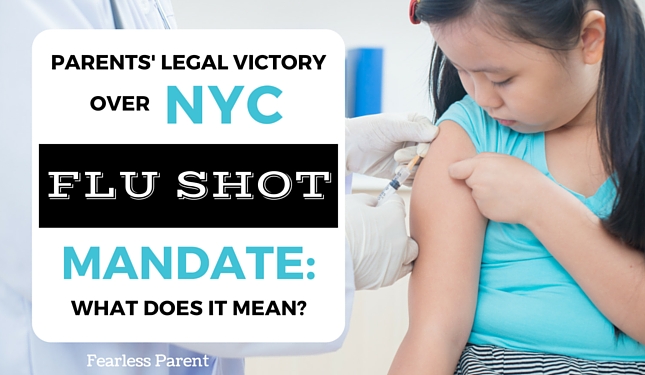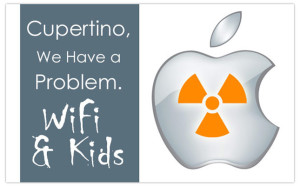12/21: Flu shot mandate for all kids introduced
Breaking news… 12/21/15
Predictably, on the heels of the judicial invalidation of the City of New York Board of Health’s rule mandating the influenza vaccine for some preschoolers, a State Assemblyman announced the introduction of legislation that would mandate the vaccine for all children in New York State schools. The mandate, if enacted, would be far broader that the New York City rule, which was applicable only to New York City licensed preschools and allowed parents to make the decision whether most New York City preschoolers and all other children in the state should receive the influenza vaccine.
A broad influenza mandate has been considered before by the New York State legislature, but was rejected. Parroting statistics issued by New York City’s Commissioner of Health, Representative Jeffrey Dinowitz (D-Bronx), sponsor of the the broad influenza mandate, claimed that influenza causes 24,000 deaths each year in the United States.
When it comes to the flu shot, parents should know that:
- Flu death statistics are unreliable. At various times, the Centers for Disease Control has claimed that influenza causes 36,000 deaths per year, but the statistic has been challenged on several grounds, because most deaths are from pneumonia and are not verified as influenza related.
- The flu vaccine is not very effective. The CDC conceded that last year’s influenza vaccine was only about 23% effective because the vaccine did not contain an influenza antigen that helped induce immunity to the influenza strain actually circulating in the United States population.
- Incorrect strains often selected. Because the influenza virus mutates rapidly, circulating strains vary from time to time. The lead time required to produce the vaccine for the fall and winter flu season requires public health officials and vaccine manufacturers to predict the strains that will circulate months in advance. They are often wrong.
- Flu shot is not shown to be effective in infants and toddlers. The highly respected Cochrane Review, which produces reports about the effectiveness and safety of vaccines, has reported that the influenza vaccine has never been shown to be effective in preventing influenza among young children and its overall effectiveness is in doubt.
- New bill seeks to add 13 required shots to the schedule. If enacted, Rep. Dinowitz’s legislation would add as many as 13 vaccines to the mandated scheduled for children, by the time they are 18 years of age. This is because the influenza vaccine confers short lived immunity to influenza, as mutated strains routinely circulate, thus requiring vaccination annually, albeit often even the vaccination fails to confer immunity.
- Most flu shots contain mercury-based preservative. In addition, while New York law restricts the amount of thimerosal, a mercury-containing preservative, in influenza vaccines, the New York State Commissioner of Health routinely promotes mercury-containing influenza vaccines, because of claimed shortages of preservative-free influenza vaccines. Mercury is a known neurotoxin. The likely effect of Rep. Dinowitz’s proposed legislation would be to expose at least some of New York’s children to annual doses of the neurotoxin.
- Adverse reactions of flu vaccine are serious. This is in addition to the known dangers of the influenza vaccine, which is recognized by authorities as a cause of autoimmune injuries such as Guillain-Barré syndrome, which manifests as peripheral neuropathy including paralysis, or other injuries resulting from an inflammatory disease process.
Given the routinely low level of efficacy of the influenza vaccine and the demonstrated risk of injury, many of New York’s parents question the judgment of proposals to mandate the influenza vaccine for children of any age.
As I have pointed out, the New York State legislature is the battleground over who controls whether New York’s children get vaccines. Now that the courts stated clearly that vaccine mandates are not within the domain of executive power, parents who want to retain choice and true informed consent over their children’s medical decisions must say so to their state representatives.
12/16: Parents’ legal victory, what does it mean?
The importance of the successful challenge by parents against the New York City influenza vaccine mandate announced on 12/16/15 [1] cannot be exaggerated. In an atmosphere of vaccine zealotry trampling on parents’ rights from California to Rhode Island, a bold legal challenge blocked unprecedented executive action by the City’s former Mayor.
Backdrop for the NYC flu shot mandate
The legal controversy’s context is important:
1) influenza vaccines have never been shown to be effective for inducing immunity in infants [2],
2) influenza vaccines are ineffective in providing protection for anyone – public health guesswork anticipating flu virus strains is often wrong [3], and
3) the influenza vaccine, like all vaccines, injures an unknown percentage of those who receive it, often through an autoimmune or inflammatory disease process [4].
The third point is particularly troubling, as the CDC has since 2010 recommended the flu vaccine for children over 6 months of age [5]. Vaccine injuries are difficult to identify in infants and toddlers. Pediatricians are loath to ascribe neurodevelopmental disorders to any vaccine, as such injuries are not easily attributed to diagnoses with no known cause. Does the influenza vaccine cause some injuries? Officially, no one knows; public officials have denied the influenza vaccine’s dangers for children, but convincing studies have never been done.
A legal question re: limits of executive power
While flu shot concerns form the background of the recent NYC skirmish, none of them mattered. The New York City mandate hinged strictly on legal points, focusing on the limits of executive power.
In 2013, NYC’s outgoing Mayor proposed the Vaccine Powers Rule, including an influenza vaccine mandate. He chose to circumvent the usual route for vaccine mandates, the state legislature, relying solely on executive power. The Board of Health imposed a rule requiring all city-licensed preschools to exclude children who do not receive influenza vaccine, while state-licensed preschools had no such requirement. Parents opposed the mandate, to no avail. The Mayor’s executive power prevailed, circumventing the state legislature, where influenza vaccine mandates had been considered and rejected. New York City became the only municipality in the state where the flu vaccine was required, and only for preschoolers.
Parents respond with legal action
Facing the NYC executive power juggernaut, parents who wanted choice for their preschoolers sought another way. How could they stop a vaccine mandated for preschoolers nowhere but New York City? Fortunately, there are limits to the Mayor’s executive power – in 2013, a Board of Health rule limiting the size of sugary drinks – the “portion cap rule” was struck down because it circumvented NYC’s legislative body, the City Council. The “sugary drinks” case reached New York’s highest court, the Court of Appeals, which agreed with the trial court, striking down the portion cap.
Activist parent John Gilmore, who with other advocates has led vaccine justice efforts in the state legislature for more than a decade, brought the issue to a lawyer active in vaccine justice issues. The analysis produced a resounding “yes”: the issue was strong, although stopping executive action enforcing vaccine mandates was a different consideration than blocking executive action regulating sugary drinks. In addition, NY’s highest court, the Court of Appeals, was split on the limits of executive authority in the public health domain – surely the case would eventually be decided on the importance public health officials place on vaccine mandates.
Eventually, advocates enlisted a talented young NYC lawyer, Aaron Siri, to take the case on a pro bono basis (i.e., without compensation), as the funds available to pay even reduced rates for such legal work were not available. In the sugary drinks litigation it was well-financed trade associations with a stake in selling sugary drinks that backed the legal challenge to the Board of Health’s soda cap rule.
Front lines of debate: state legislatures
Siri adroitly constructed a focused legal challenge: New York City usurped the legislative authority historically vested in the legislature to mandate vaccines. New York State’s trial level court agreed, issuing a permanent injunction that blocked the Board of Health’s enforcement of the flu vaccine mandate for preschoolers. According to the New York Times, the City will appeal [6]. The NYC Health Commissioner (whose predecessor is now the Director of the Centers for Disease Control or CDC) stressed the importance of the flu shot in stemming the annual predictions, which many observe never materialize, of flu pandemics and flu-related deaths.
Since the early 1900’s, New York City has been an historic bastion of the policy promoting vaccination as the cornerstone of public health, often as part of a progressive political agenda [7]. Public health authorities will no doubt continue their aggressive vaccine-manufacturer-funded push, seen from California to Rhode Island, to impose inflexible vaccine mandates, overriding sound parental judgment in making medical decisions for their children.
The New York decision shows that, notwithstanding proposals in Congress to federalize vaccine mandates [8], the real battleground over vaccine mandates resides in state legislatures. Parents who seek to preserve their authority over health choices should be encouraged by the NYC decision, but it has no legal effect on state mandates, except to signal to municipalities that the authority of state legislatures cannot be usurped.
State legislators must hear from parents
Parents who want to maintain authority over health decisions for their children, must appeal to their legislators. Unlike our representatives in Congress who are remote from constituents, state legislators’ decisions are not routinely dominated by public health orthodoxy and industry money. As in California, where personal belief exemptions were eliminated, state legislatures are being pushed to limit parental rights. There are industry-fueled initiatives against choice in states such as Rhode Island, which recently enacted a mandate requiring seventh graders to be vaccinated with Gardasil [9], an HPV vaccination of unproven efficacy, plagued by growing concerns worldwide about safety.
The message for parents is clear: organize responsibly to make your voices heard by your state legislators. If parents do organize and fight for their rights, legislators likely will heed parental voices, as they have in the past, to rebuff efforts to mandate vaccines of dubious efficacy, like the influenza vaccine.
The New York decision enjoining executive vaccine mandates serves as a strong legal statement favoring a democratic process that features accountability and counters autocratic health measures. Parents can only take advantage of such enlightened legal outcomes if they are involved in the legislative process. Parents in New York City now have an opportunity to join with their fellow parents to make their voices heard.
References
[1] Garcia et al. v. New York City Department of Health and Mental Hygiene et al., Index No. 161484/2015, 12/16/2015.
[2] Jefferson T et al. Vaccines for preventing influenza in healthy children (Review), The Cochrane Collaboration, published in The Cochrane Library 2012, Issue 8.
[3] “Seasonal influenza vaccine effectiveness,” CDC (accessed 12/20/15)
[4] Government authorities have increasingly recognized the types of injuries, some autoimmune in origin, caused by the seasonal trivalent influenza vaccine. See, for example: Vaccine Injury Compensation Table (Guillain Barré Syndrome) (accessed 12/20/15) and Vaccine Injury Compensation Table (Shoulder Injury Related to Vaccine Administration) (accessed 12/20/15)
[5] “https://www.infectioncontroltoday.com/vaccines-vaccination/acip-reaffirms-recommendation-annual-influenza-vaccination,” Infection Control Today (accessed 12/20/15).
[6] “New York City’s flu shot mandate for young children is struck down,” New York Times (accessed 12/20/15)
[7] See Willrich, Michael, Pox: An American History, The Penguin Press, 2011, for a well-presented account of the history of vaccination policy in New York City and the United States.
[8] On May 1, 2015, Rep. Frederica S. Wilson introduced H.R. 2232, the Vaccinate All Children Act of 2015, which would function to mandate the CDC/ACIP recommended vaccine schedule, with an exemption for medical reasons only, by restricting federal funding for states that not in compliance. See “Congresswoman Frederica S. Wilson introduces legislation to require public school students to receive vaccines,” Wilson.house.gov. To date, Rep. Wilson has secured no cosponsors for her bill, nor has the bill moved forward. Another bill introduced in the Senate in early 2015 by California Senators Barbara Boxer in the Senate, S. 486, and in the House of Representatives by California Rep Anna Eshoo, H.R. 933, would operate to exclude children who did not produce proof of compliance with the ACIP/CDC vaccine recommendations from a Head Start program. There are no cosponsors for the Senate bill and only 9 cosponsors for the House version. Neither bill appears to be moving forward.
[9] “Parents protest R.I. mandating HPV vaccine for teens,” The Boston Globe (accessed 12/20/15). HPV vaccines (Gardasil by Merck and Cervarix by Glaxo Smithkline) have engendered concerns worldwide, including Denmark, Spain, Ireland, Japan, India and New Zealand, among other nations. Gardasil vaccine survivors in Ireland launch support group, Health Impact News (accessed 12/20/15). Japan has withdrawn approval for the HPV vaccine (last accessed 12/20/15).
 Robert J. Krakow is the principal of the Law Office of Robert J. Krakow in New York City, where he has practiced for over 40 years. His focus has been on the trial of civil and criminal cases, with a specialty in representing children and adults seriously injured by vaccines. Prior to forming his firm, Bob was a prosecutor for the decade of the 1980’s with the New York County District Attorney’s office and served as Bureau Chief in the Office of the Special Narcotics Prosecutor for the City of New York. He is a community organizer, university lecturer, public interest advocate. Bob has founded and volunteered for many not-for-profit organizations, including serving as Chair and Board Member of Lifespire, a 65 year-old NYC organization that serves 5,000 disabled people every day. Bob has lectured and testified on the subjects of vaccine injury, vaccine exemptions, and the rights of people with disabilities.He founded and/or serves/served on the boards of many prominent autism and vaccine safety advocacy organizations. Bob serves on the boards of the Center for Personal Rights and Health Freedom Action.
Robert J. Krakow is the principal of the Law Office of Robert J. Krakow in New York City, where he has practiced for over 40 years. His focus has been on the trial of civil and criminal cases, with a specialty in representing children and adults seriously injured by vaccines. Prior to forming his firm, Bob was a prosecutor for the decade of the 1980’s with the New York County District Attorney’s office and served as Bureau Chief in the Office of the Special Narcotics Prosecutor for the City of New York. He is a community organizer, university lecturer, public interest advocate. Bob has founded and volunteered for many not-for-profit organizations, including serving as Chair and Board Member of Lifespire, a 65 year-old NYC organization that serves 5,000 disabled people every day. Bob has lectured and testified on the subjects of vaccine injury, vaccine exemptions, and the rights of people with disabilities.He founded and/or serves/served on the boards of many prominent autism and vaccine safety advocacy organizations. Bob serves on the boards of the Center for Personal Rights and Health Freedom Action.













Hopefully it means no one will suffer a flu shot injury like I did.
Assemblyman Dinowitz Introduces Legislation Mandating Flu Shots for Children to NYS Assembly
http://assembly.state.ny.us/mem/Jeffrey-Dinowitz/story/67010/
Yes, thank you Dariusz. This is unfortunately not a surprise. And introducng these things a few days before Christmas is par for the course. We have an addendum coming shortly.